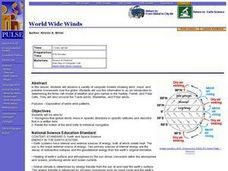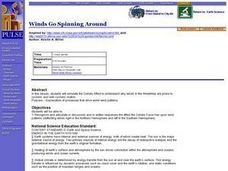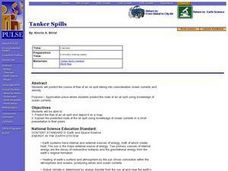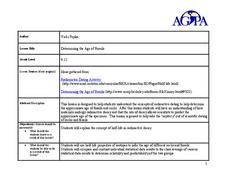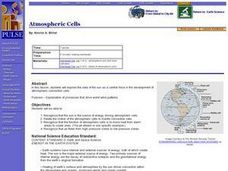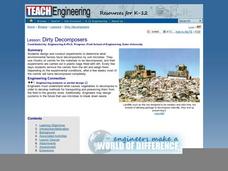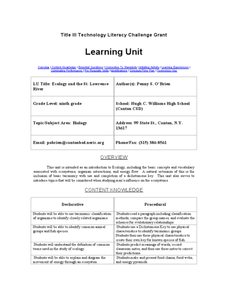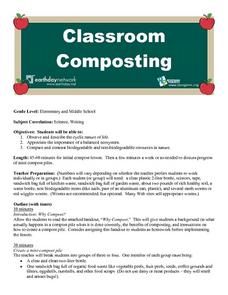Curated OER
It's Okay to Exhale: Photosynthesis and Cellular Respiration
Pupils will observe the differences between photosynthesis and cellular respiration. Then they observe the links due to climate changes and relate how climate change affects their lives.
Curated OER
Earth Surface Socratic Questions
Students explore the ways Earth's surface is shaped by hydrologic, climate and tectonic forces by participating in a whole class discussion. They respond to prompts that lead them to conclusions about the relationships between landforms...
Curated OER
Biomass As a Fuel
Pupils investigate the use of biomass as a fuel. They discuss energy and its uses in their homes. They explore the two types of energy, potential and kinetic and examples of both types. They study the process of photosynthesis and...
Curated OER
Rain Forests: Sustainable Use
Students discuss their opinion on a teacher given scenario. In this chemistry lesson plan, students research the value of rainforests. They relate these ideas to current forestry practices.
Curated OER
Metabolism Test Review
In this metabolism test review, students define several terms. Students write balanced chemical equations for aerobic cellular respiration. Students complete several multiple choice questions.
Curated OER
World Wide Winds
High schoolers recognize that global winds move in specific directions in specific latitudes and describe that in a written form. They relate the motion of the wind belts to historical navigation.
Curated OER
Winds Go Spinning Around
Students simulate the Coriolis Effect to comprehend why winds in the Westerlies are prone to cyclonic and anti-cyclonic motion. They arrive at an explanation of processes that drive world wind patterns
Curated OER
Tanker Spills
Young scholars predict the flow of an oil spill and depict it on a map. They explain the predicted route of the oil spill using knowledge of ocean currents in a short presentation to their peers.
Curated OER
How Do We Measure Absolute Time?-Geologic Clocks
In this absolute time worksheet, students define radiometric dating, tree rings and varves as means to measure absolute time. They are given information about each of these methods of dating.
Curated OER
ESL Holiday Lessons: Bike to Work Day
In this language skills learning exercise, students read an article about Bike to Work Day. Students respond to 6 matching questions, 29 fill in the blank questions, 30 multiple choice questions, 12 word scramble ...
Curated OER
Water Purification
Learners develop an understanding and appreciation of water purification techniques and their implications for health maintenance.
Curated OER
Fossil Fuels, Who Needs Them
Ninth graders explore how electricity is created and distributed through alternative production methods. Students participate in hands-on activities, research, lecture based instruction, and CD ROM resources.
Curated OER
Plants and Animals Depend Upon One Another
First graders study plants and animals and how they depend on one another. They also study that plants give energy to animals and provide oxygen needed for life. Finally, 1st graders give examples of the roles plants and animals play...
Curated OER
Beaver Ecology
Students explore the lives of bgeahvers. They identify the physical and behavioral adaptations that help beavers survive in their environment. Students compare and contrast how beavers influence the ecology of both forest and aquatic...
Curated OER
Determining the Age of Fossils
Students examine the concept of radioactive dating. In this radioactive dating lesson, students investigate how to determine the ages of fossils and rocks as they learn about half-life radioactive decay.
Curated OER
Acid Rain
Students use real-time weather maps to determine the likelihood of acid rainfall in a region. Students apply their understanding of interaction between weather systems, land and air pollution, to address acid rain and the effects on...
Curated OER
Atmospheric Cells
Students recognize that the sun is the source of energy driving atmosphere cells. They relate the motion of the atmospheric cells to mantle convection cells. Students recognize that the function of atmospheric cells is to move heat from...
Curated OER
Human Impact on the Environment
In this environmental science worksheet, students complete a crossword puzzle with 26 questions about human impact on the environment.
Curated OER
Plant Science: Introduction to Photosynthesis
Students explore the process of photosynthesis in plants. They discuss the purpose of photosynthesis and its components. Students discuss the importance of photosynthesis for plants and they examine the parts of the plant that play an...
Curated OER
Water Retention and Soil Variation in Local Ecosystems
Students identify the differences in local soil types and the relationship between soil size and water retention. They are introduced to microenvironmental conditions in ecosystem sustainability.
Curated OER
Dirty Decomposers
Seventh graders design and conduct experiments to determine what environmental factors favor decomposition by soil microbes. They use chunks of carrot for the materials to be decomposed, and their experiments are carried out in plastic...
Curated OER
Ecology and the St. Lawrence River
Ninth graders complete a unit of lessons on ecosystems, organism interactions, and energy flow. They create a key for known species of fish, diagram the movement of energy through an ecosystem, and create and present food chains and food...
Curated OER
Structure of the Earth
Sixth graders define atmosphere and hydrosphere, explore through experimentation how the atmosphere was formed, and describe the layers of the Earth's atmosphere and their distances.
Curated OER
Classroom Composting
Pupils discover the benefits of composting. They identify the steps of decomposition as well. They are read a book and discuss what items decompose.
Other popular searches
- Carbon Cycle Diagram
- Carbon Cycle Powerpoint
- Carbon Cycle Activities
- Nitrogen and Carbon Cycle
- Carbon Cycle Lesson Plans
- Carbon Cycle Game
- The Carbon Cycle
- Carbon Cycle Lab
- Carbon Cycle Worksheet
- Ecology Carbon Cycle
- Oxygen Carbon Dioxide Cycle
- Carbon Cycle Diagram Label







